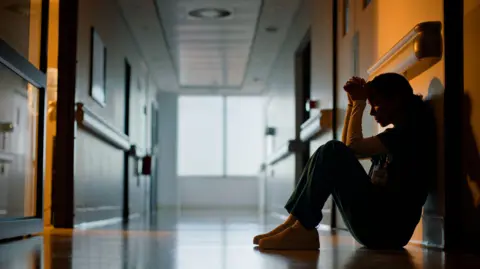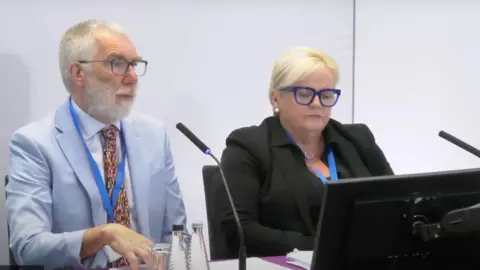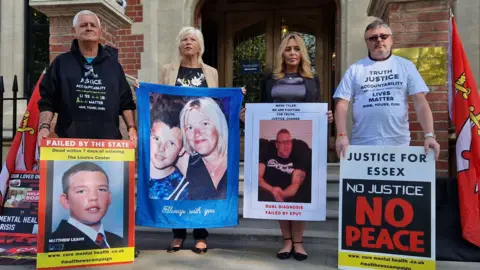Inquiry told of 'culture of fear' in mental health
 Getty Images
Getty ImagesMental health staff are so scared about being blamed for things going wrong they have lost empathy for patients, according to an expert witness at England's first mental health inquiry.
Consultant psychiatrist Dr Ian Davidson gave evidence at the Lampard inquiry, which is looking into the deaths of 2,000 patients in Essex from the year 2000 to the end of 2023.
He said a "culture of fear" had developed and that staff felt like they would get criticised whatever they did.
Essex Partnership University NHS Foundation Trust (EPUT) has apologised to those affected.
 Lampard Inquiry/Youtube
Lampard Inquiry/YoutubeDr Davidson gave the example of a community mental health team, trying to manage waiting lists.
"In order to see more people, you then have to discharge more people but if you discharge someone and something goes wrong, you get blamed for that," he said.
"If you don't discharge people and try and increase your caseload, then your time per case goes down. So, if then something happens because someone didn't get a visit for several weeks, you get blamed for that."
He said if staff were being "asked to do four or five different tasks at the same time", their ability to have a clear focus on each person reduced.
"Every human being has got a limited ability to be compassionate and empathic. The more we are stressed.. the more we are rushed off our feet, the less time you have to think or to provide a compassionate response," he said.
The psychiatrist of 23 years also said a lack of resources led to a "very defensive focus" which included staff writing notes to explain failures were not their fault.
'Compassion fatigue'
He explained the lack of registered mental health nurses in England meant that staff could not focus on therapeutic care.
Dr Davidson said there were 13,000 vacancies for mental health nurses in England in 2023, with a 26% reduction in applications for mental health nursing.
"If you have maybe six or seven staff on a ward and you have one or two registered nurses, the ratio is very heavily on the 14 healthcare support workers," he said.
He told the inquiry that it led to "compassion fatigue" where staff were distracted and not fully engaging with patients.
He said for patients and their families "that tends to undermine trust.. and therapeutic relationships".
A second expert witness, former chief nurse Maria Nelligan, said there were "periods of time" during the last 25 years when "there was an emphasis on reducing costs and healthcare support workers are cheaper than registered nurses".
She said a good mental health ward would have "excellent engagement with patients and carers with a positive culture of respect and compassion".
Ms Nelligan said there would be a programme of "meaningful activities", with each patient given a timetable for one-to-one sessions with a nurse.
 Ben Bauer/PA Wire
Ben Bauer/PA WireThe government said it was due to unveil a new NHS staffing plan in the summer.
It said in December that alongside "reform and investment", it would ensure it had the "right workforce at the right place, at the right time".
A Department of Health and Social Care spokesperson said: "Our deepest sympathies are with the families who have lost a loved one in these tragic circumstances.
"It's crucial that every person affected by this ordeal has a right to tell their story."
The Lampard Inquiry will hear evidence across several sessions until October 2026, with Baroness Lampard's report likely to be published in 2027.
Follow Essex news on BBC Sounds, Facebook, Instagram and X.
